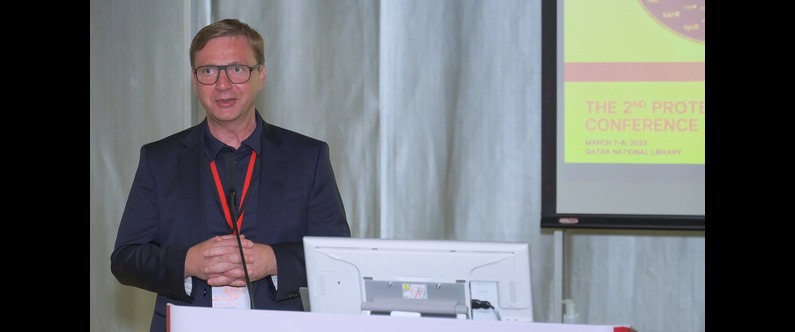Global proteomics experts convene for WCM-Q research conference at QNL
 Proteomics expert Prof. Dr. Frank Schmidt speaks at the conference.
Proteomics expert Prof. Dr. Frank Schmidt speaks at the conference.
Leading researchers in the field of proteomics convened at Qatar National Library for a two-day conference organized by Weill Cornell Medicine-Qatar (WCM-Q).
Researchers from Qatar, Switzerland, Germany, Spain, Sweden, the US, Canada and South Africa were in attendance at the 2nd WCM-Q Proteomics Conference to discuss the latest discoveries in proteomics, a branch of molecular biology that studies the set of proteins expressed by the genome of an organism.
Proteomics is considered an important field because it helps researchers understand the roles played by proteins in healthy and unhealthy cells, giving insight into fundamental biological processes. Proteomics has many potential applications, including in personalized medicine, biomarker discovery to aid diagnosis of diseases, identifying potential targets for development of new drugs, and characterizing complex molecular pathways that lead to disease, among other uses. Proteomics has also played a key role during the COVID-19 pandemic, providing tools for researchers to analyze and understand the characteristics of COVID-19 and the SARS-CoV-2 virus at the molecular level, which aided vaccine design.
The two-day conference began with welcoming remarks by Dr. Javaid Sheikh, dean of WCM-Q, and Dr. Mohammed Jarrar, senior scientific expert at the Qatar Research, Development and Innovation Council (QRDI Council). The main sponsor of the conference was Qatar National Research Fund (QNRF conference grant number CWSP22-C-0911-22039). There were also introductory remarks by the conference organizers, Prof. Dr. Frank Schmidt, associate professor of biology and director of the proteomics core, and Dr. Karsten Suhre, professor of physiology and biophysics and director of the bioinformatics core, both of WCM-Q.
.jpg)
In recent years, Doha has emerged as an important hub and center of excellence in proteomics research thanks to significant investment in expertise and hi-tech research infrastructure. WCM-Q plans to host an international proteomics conference on a regular basis to support the development of this important area of scientific discovery. The conference also provided a means for bridging the gaps between the complementary specialisms of proteomics, genomics, and bioinformatics to facilitate ‘multiomics’ approaches to research.
Dr. Sheikh said: “It is extremely gratifying to welcome so many eminent researchers in such an important field of discovery to Qatar to share their expertise in proteomics. We are very grateful to QNRF and the QRDI Council for sponsoring this conference, as we are to Qatar Foundation and the leadership of the State of Qatar for their stalwart support for our mission to conduct cutting-edge biomedical research in Qatar. We believe this area of research offers huge potential for enhancing healthcare and improving our understanding of biology at the fundamental level.”
The conference heard from one of the pioneers of proteomics, Dr. Ruedi Aebersold of the Institute of Molecular Systems Biology, who spoke about the use of mass spectrometry technology to measure multiple layers of proteomic information. There was also a presentation by Dr. Laith Abu-Raddad, professor of population health sciences/director of the biostatistics, epidemiology, and biomathematics research core at WCM-Q, on the use of proteomics to understand COVID-19, while Dr. Houari Abdesselem of Hamad Bin Khalifa University discussed his group’s research, which uncovered a neurological protein signature for severe COVID-19. Among a total of 16 presentations, Dr. Schmidt spoke about combining proteomic data from multiple studies to discover more robust protein markers for disease and underlying metabolic pathways. Dr. Suhre discussed his work on using genome-wide association studies to identify traits of proteins that overlap with fixed positions – or ‘loci’ - on chromosomes where a particular genes are located.
Other key speakers included Dr. Christopher Overall of the University of British Columbia in Vancouver with a presentation about a viral protease called 3CLpro, which is key to the replication of the SARS-CoV-2 virus; Dr. Johan Malmström of Lund University in Sweden speaking about the structural proteo-genomics of circulating antibodies; and Dr. Bernd Wollscheid of ETH Zurich on new nano-technologies for mapping molecular receptors on the surfaces of cells.
.jpg)
In addition to providing updates of important advances in proteomics, the conference also presented an opportunity for researchers to meet and discuss potential collaborations on future research projects. The conference was co-sponsored by East West Trading International, biomedical research company Olink, and Sengenics, a precision medicine company.
Prof. Dr. Schmidt thanked QNRF for their funding support for the conference and the Schmidt and Suhre laboratories at WCM-Q. He also thanked Qatar Foundation for supporting the research efforts at WCM-Q through the Biomedical Research Program (BMRP).
Prof. Dr. Schmidt added: “We are very gratified that the 2nd WCM-Q Proteomics Conference was so well supported by international experts in the field, making this a great opportunity for knowledge exchange and future collaborations. We believe Doha is now well-established as an important international hub and center of excellence in proteomics and in biomedical research in general, with a proven capacity for hosting top-level international research conferences. Proteomics research is thriving in Qatar and the success of this conference may lay the groundwork for Doha to possibly host the HUPO World Congress in the near future, which is the largest global conference related to proteomics.”